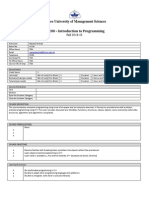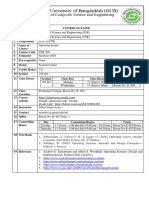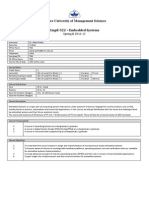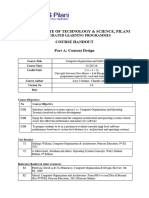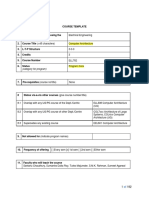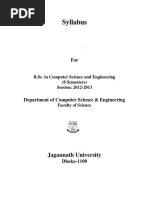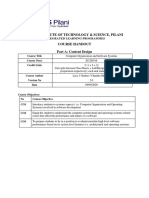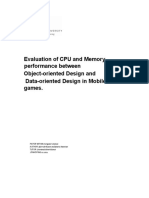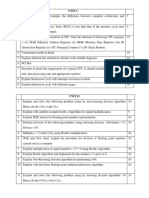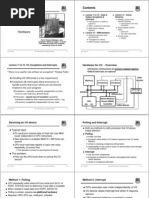0 ratings0% found this document useful (0 votes)
237 viewsCS 225 - Fundamentals of Computer Systems - Junaid H Siddiqui
CS 225 - Fundamentals of Computer Systems - Junaid H Siddiqui
Uploaded by
monimawadThis document provides information about a course titled "Fundamentals of Computer Systems" being offered at Lahore University of Management Sciences in the Fall 2017 semester. It outlines details about the instructor, course basics like credit hours and schedule, prerequisites, learning outcomes, grading breakdown, examination structure, and tentative schedule of topics. The primary textbook listed is "Computer Systems, A Programmer's Perspective" by Randal E. Bryant and David O'Hallaron.
Copyright:
© All Rights Reserved
Available Formats
Download as PDF, TXT or read online from Scribd
CS 225 - Fundamentals of Computer Systems - Junaid H Siddiqui
CS 225 - Fundamentals of Computer Systems - Junaid H Siddiqui
Uploaded by
monimawad0 ratings0% found this document useful (0 votes)
237 views2 pagesThis document provides information about a course titled "Fundamentals of Computer Systems" being offered at Lahore University of Management Sciences in the Fall 2017 semester. It outlines details about the instructor, course basics like credit hours and schedule, prerequisites, learning outcomes, grading breakdown, examination structure, and tentative schedule of topics. The primary textbook listed is "Computer Systems, A Programmer's Perspective" by Randal E. Bryant and David O'Hallaron.
Original Description:
CS 225 - Fundamentals of Computer Systems - Junaid H Siddiqui
Copyright
© © All Rights Reserved
Available Formats
PDF, TXT or read online from Scribd
Share this document
Did you find this document useful?
Is this content inappropriate?
This document provides information about a course titled "Fundamentals of Computer Systems" being offered at Lahore University of Management Sciences in the Fall 2017 semester. It outlines details about the instructor, course basics like credit hours and schedule, prerequisites, learning outcomes, grading breakdown, examination structure, and tentative schedule of topics. The primary textbook listed is "Computer Systems, A Programmer's Perspective" by Randal E. Bryant and David O'Hallaron.
Copyright:
© All Rights Reserved
Available Formats
Download as PDF, TXT or read online from Scribd
Download as pdf or txt
0 ratings0% found this document useful (0 votes)
237 views2 pagesCS 225 - Fundamentals of Computer Systems - Junaid H Siddiqui
CS 225 - Fundamentals of Computer Systems - Junaid H Siddiqui
Uploaded by
monimawadThis document provides information about a course titled "Fundamentals of Computer Systems" being offered at Lahore University of Management Sciences in the Fall 2017 semester. It outlines details about the instructor, course basics like credit hours and schedule, prerequisites, learning outcomes, grading breakdown, examination structure, and tentative schedule of topics. The primary textbook listed is "Computer Systems, A Programmer's Perspective" by Randal E. Bryant and David O'Hallaron.
Copyright:
© All Rights Reserved
Available Formats
Download as PDF, TXT or read online from Scribd
Download as pdf or txt
You are on page 1of 2
Lahore University of Management Sciences
CS 225 – Fundamentals of Computer Systems
Fall 2017
Instructor Junaid Haroon Siddiqui
Room No. SSE 9-G20A
Office Hours TBD
Email junaid.siddiqui@lums.edu.pk
Telephone 8197
Secretary/TA TBD
TA Office Hours TBD
Course URL (if any)
Course Basics
Credit Hours 4
Lecture(s) Nbr of Lec(s) Per Week 2 Duration 100 mins
Recitation/Lab (per week) Nbr of Lec(s) Per Week Duration
Tutorial (per week) Nbr of Lec(s) Per Week Duration
Course Distribution
Core Computer Science (Equivalent to CS320+CS320L)
Elective
Open for Student Category All
Close for Student Category
COURSE DESCRIPTION
We discuss how computers operate at fairly low level of abstraction and then discuss how computer systems build as layers and layers of
abstraction. Our focus will be to introduce computer systems from the perspective of a programmer, rather from the more traditional perspective
of a system implementer.
After taking this course, you will know the components of a computer and how do they fit together. How computers do arithmetic and how does
the code you write actually execute? How does a program in a high level language like C get translated into a form the machine can execute? How
can you write code likely to execute efficiently? How is information stored and accessed? How does your program access existing "libraries"?
COURSE PREREQUISITE(S)
• CS 100
Learning Outcomes
Ref: Learning Outcomes of ACM Curriculum Guidelines 2013
• SF/Computational Paradigms (Core Tier 1, 3 hours)
• SF/Cross-Layer Communications (Core Tier 1, 3 hours)
• SF/State and State Machines (Core Tier 1, 6 hours)
• AR/Digital Logic and Digital Systems (Core Tier 2, 3 hours)
• AR/Machine level representation of data (Core Tier 2, 3 hours)
• AR/Assembly level machine organization (Core Tier 2, 6 hours)
• AR/Memory system organization and Architecture (Core Tier 2, 3 hours)
• AR/Interfacing and Communication (Core Tier 2, 1 hour)
• PD/Parallel Architecture (Core Tier 1+2, 3 hours)
SF/Parallelism (Core Tier 1, 1 hour)
•
SF/Evaluation (Core Tier 1, 3 hours)
Lahore University of Management Sciences
Grading Breakup and Policy
Attendance: 10% (Excluding first two classes and both exams, 10 marks for attending all 24 classes, 8 for 23, 6 for 22, 4 for 21, 2 for 20, and 0 for
attending less than 20 classes. Coming after 5 minutes of class start or leaving before the end of the class counts as absence. For genuine reasons,
you may check with me before missing a class, but in most cases, I’ll refer you to OSA for verification.)
Assignments: 20% (Tentatively 7 assignments of 4 marks each but maximum marks in assignments category cannot be more than 20. Thus, you
can get full assignment marks by finishing 5 assignments perfectly or by doing a good part of all 7 assignments. Getting perfect score is hard so do
not skip assignments. Plagiarism cases are forwarded to DC without warning. Late submissions even by a second are not accepted.)
Mid-term: 20% + 20%
Final: 30% (Comprehensive)
Examination Detail
Midterm Yes/No: Yes (Two)
Exams Duration: 100 minutes (In class timings)
Yes/No: Yes
Final Exam Duration: 3 hours
Tentative Schedule
Session Topics
1 Introduction (Ch 1)
2 Information Storage (Ch 2.1-2.2)
3 Integer operations (Ch 2.3)
4 Floating point operations (Ch 2.4)
5 Program encodings (Ch 3.1-3.3)
6 Data movement and arithmetic (Ch 3.4-3.5)
7 Control flow (Ch 3.6)
8 Procedures (Ch 3.7)
9 Arrays and structures (Ch 3.8-3.9)
10 Buffer overflow (Ch 3.10)
11 Exam 1
12 Instruction set architecture (Ch 4.1)
13 Logic Design (Ch 4.2)
14 Logic Design & Verilog (Ch 4.2)
15 Sequential processor design (Ch 4.3)
16 Sequential processor details (Ch 4.3)
17 Pipelining (Ch 4.4)
18 Pipelined processor design (Ch 4.5)
19 Stalls and Bubbles (Ch 4.5)
20 Exam 2
21 Memory Hierarchy and locality of reference (Ch 6.1-6.3)
22 Introduction to cache design (Ch 6.4)
23 Cache friendly code (Ch 6.5-6.6)
24 Linking and loading programs (Ch 7.1-7.9)
25 Interrupts and hardware interfacing (Ch 8.1)
26 Processes (Ch 8.2-8.4)
27 Dynamic memory allocation and garbage collection (Ch 9.9-9.10)
28 Memory related bugs (Ch 9.11)
Textbook(s)/Supplementary Readings
Computer Systems, A Programmer's Perspective by Randal E. Bryant and David O'Hallaron, Prentice Hall, 2016 (Third Edition)
You might also like
- Yan Solihin - Fundamentals of Parallel Computer ArchitectureDocument547 pagesYan Solihin - Fundamentals of Parallel Computer ArchitectureJason J100% (2)
- 2019 - The Technology Fallacy People Are The Real Key To Digital TransformationDocument7 pages2019 - The Technology Fallacy People Are The Real Key To Digital TransformationmonimawadNo ratings yet
- ECON - 1615 Managerial Economics Draft Syllabus - A - TomicDocument4 pagesECON - 1615 Managerial Economics Draft Syllabus - A - TomicmonimawadNo ratings yet
- CS 382-Network-Centric Computing-Muhammad Fareed ZaffarDocument4 pagesCS 382-Network-Centric Computing-Muhammad Fareed ZaffarMuhammad HassanNo ratings yet
- CSC 2304 SyllabusDocument3 pagesCSC 2304 SyllabusAmine NaitlhoNo ratings yet
- ECON 230-Statistics and Data Analysis-Saher AsadDocument2 pagesECON 230-Statistics and Data Analysis-Saher AsadmonimawadNo ratings yet
- CS11102 Introduction To Computer Science 2023-2024Document5 pagesCS11102 Introduction To Computer Science 2023-2024Maya DanaNo ratings yet
- LUMS EE - 2nd Year Course OutlinesDocument34 pagesLUMS EE - 2nd Year Course OutlinesAhsan Ahmed MoinNo ratings yet
- ABET Course Syllabus - Spring Semester 2024/2025 CS11102 Introduction To Computer ScienceDocument4 pagesABET Course Syllabus - Spring Semester 2024/2025 CS11102 Introduction To Computer Sciencesaraalqaisi2005No ratings yet
- Course Outline of CSE 309 - Section A PDFDocument5 pagesCourse Outline of CSE 309 - Section A PDFSafialIslamAyonNo ratings yet
- CS-340 OutlineDocument4 pagesCS-340 Outline20100095No ratings yet
- Course Outline of CSE 211 PDFDocument4 pagesCourse Outline of CSE 211 PDFSafialIslamAyonNo ratings yet
- Course Plan - IMSDocument10 pagesCourse Plan - IMSanmolsupr.officialNo ratings yet
- CMPE 522-Embedded Systems-Adeel PashaDocument3 pagesCMPE 522-Embedded Systems-Adeel PashaZia AzamNo ratings yet
- CSC204 SyllabusDocument2 pagesCSC204 Syllabuscool_vinku128No ratings yet
- Lahore University of Management Sciences CS 202 - Data StructuresDocument2 pagesLahore University of Management Sciences CS 202 - Data StructuresWaleed KhalidNo ratings yet
- DLD Lecture No. 1 Introduction To DLD 26 September 23Document25 pagesDLD Lecture No. 1 Introduction To DLD 26 September 23Dua NaseemNo ratings yet
- CS 202-Data Structures-Dr - Ihsan Ayyub QaziDocument2 pagesCS 202-Data Structures-Dr - Ihsan Ayyub QaziZia AzamNo ratings yet
- course_outlineDocument3 pagescourse_outlinebrolali904No ratings yet
- CS11102 Introduction To Computer Science 2021-2022Document5 pagesCS11102 Introduction To Computer Science 2021-2022Ibrahim AbdelfattahNo ratings yet
- Lesson Plan: R.V. College of Engineering, BangaloreDocument14 pagesLesson Plan: R.V. College of Engineering, BangaloreVeena Divya KrishnappaNo ratings yet
- CS322 - Computer Architecture (CA) : Spring 2019 Section V3Document57 pagesCS322 - Computer Architecture (CA) : Spring 2019 Section V3TANZEELA SHAKEELNo ratings yet
- ComputerOrganizationAndSoftwareSystems Flipped HODocument10 pagesComputerOrganizationAndSoftwareSystems Flipped HOraghunathanNo ratings yet
- Cis Ce-116l-CpDocument6 pagesCis Ce-116l-CpAnamta SiddiquiNo ratings yet
- Mehran University of Engineering and Technology, Jamshoro Department of Software EngineeringDocument2 pagesMehran University of Engineering and Technology, Jamshoro Department of Software EngineeringpathmakerpkNo ratings yet
- CSE225.7 Course OutlineDocument3 pagesCSE225.7 Course OutlineAbdullah Al AminNo ratings yet
- Real Time and Embedded System New Curriculum Based Course OutlineDocument4 pagesReal Time and Embedded System New Curriculum Based Course OutlineAyano BoresaNo ratings yet
- EE 320 (CS 320) - Computer Organization and Assembly - Jahangir IkramDocument4 pagesEE 320 (CS 320) - Computer Organization and Assembly - Jahangir IkramSheikh AsherNo ratings yet
- Course OutlineDocument5 pagesCourse OutlinezebreheNo ratings yet
- ICP Course Outline PDFDocument3 pagesICP Course Outline PDFIjlal NasirNo ratings yet
- Lecture01 IntroDocument25 pagesLecture01 IntroAbhishek AwantiNo ratings yet
- Course OutlineDocument5 pagesCourse OutlineSana KhattakNo ratings yet
- Student Data Base Full PDFDocument31 pagesStudent Data Base Full PDFShiva BandaruNo ratings yet
- BTKR 1343 Computer ProgrammingDocument9 pagesBTKR 1343 Computer ProgrammingSabikan SulaimanNo ratings yet
- Computer TechnologyDocument192 pagesComputer TechnologyAmit PatelNo ratings yet
- Tentative Outline CS-353 Computer Architecture CS Dept.Document3 pagesTentative Outline CS-353 Computer Architecture CS Dept.Mirza AbubakrNo ratings yet
- CA CourseFile AssignmentDocument14 pagesCA CourseFile AssignmentLaxman SinghNo ratings yet
- Introduction To PSUCDocument11 pagesIntroduction To PSUCMahesh G NayakNo ratings yet
- CalculusDocument42 pagesCalculusRaisulNo ratings yet
- CSE313 Course Syllabus 191 SAmdDocument3 pagesCSE313 Course Syllabus 191 SAmdMasud SarkerNo ratings yet
- Ece F215 Digital Design - HandoutDocument3 pagesEce F215 Digital Design - HandoutRishiNo ratings yet
- Control SystemDocument7 pagesControl SystemAbdul WaheedNo ratings yet
- CIS - (Data Structures and Algorithms) SPRING-20241Document9 pagesCIS - (Data Structures and Algorithms) SPRING-20241Umer FarooqNo ratings yet
- EEE 270 - Advanced Topics in Logic Design Course Syllabus, Fall 2017Document4 pagesEEE 270 - Advanced Topics in Logic Design Course Syllabus, Fall 2017Praveen MeduriNo ratings yet
- Data Structures OutlineDocument5 pagesData Structures Outlineshahzad jalbaniNo ratings yet
- C++ Syllabus 2Document6 pagesC++ Syllabus 2BineilKcThapaNo ratings yet
- CS471/EE471/CS573: Computer NetworksDocument3 pagesCS471/EE471/CS573: Computer Networksahmedsanaullah_1No ratings yet
- Course Outline of CSE 303 PDFDocument4 pagesCourse Outline of CSE 303 PDFSafialIslamAyonNo ratings yet
- COURSE SYLLABUS Introduction To C++ ProgrammingDocument3 pagesCOURSE SYLLABUS Introduction To C++ ProgrammingPercival A FernandezNo ratings yet
- 5th CE PDFDocument38 pages5th CE PDFDhrumin PatelNo ratings yet
- 256desc PDFDocument3 pages256desc PDFMelbin BabuNo ratings yet
- Birla Institute of Technology & Science, Pilani: Work Integrated Learning ProgrammesDocument8 pagesBirla Institute of Technology & Science, Pilani: Work Integrated Learning ProgrammesSunny KumarNo ratings yet
- Course Syllabus CS3520 Spring 2022 1 PDFDocument5 pagesCourse Syllabus CS3520 Spring 2022 1 PDFParam JoshiNo ratings yet
- BSC (Hons) Information Systems (F/T) - E311: Aims and ObjectivesDocument9 pagesBSC (Hons) Information Systems (F/T) - E311: Aims and ObjectivesJohn ZiziNo ratings yet
- SECP2043 Data Structures and AlgorithmsDocument4 pagesSECP2043 Data Structures and AlgorithmsAfifa HameedNo ratings yet
- It 02Document65 pagesIt 02Amit KumarNo ratings yet
- PPT#00Document26 pagesPPT#00prayaagmunshiNo ratings yet
- Updated Course Outline EE 221 - Digital - Logic - Design - Spring - 2023Document9 pagesUpdated Course Outline EE 221 - Digital - Logic - Design - Spring - 2023Laiqa AliNo ratings yet
- CS 370 - Operating Systems - Basit ShafiqDocument3 pagesCS 370 - Operating Systems - Basit ShafiqMuhammad Irfan RiazNo ratings yet
- CS 310 Algorithms - Fall 2022 (12746)Document2 pagesCS 310 Algorithms - Fall 2022 (12746)YUH 2020No ratings yet
- CS - ECE - EEE - INSTR F215 Digital Design Handout I Sem 2023-24Document3 pagesCS - ECE - EEE - INSTR F215 Digital Design Handout I Sem 2023-24Deepti MishraNo ratings yet
- C++ Advanced Programming: Building High-Performance ApplicationsFrom EverandC++ Advanced Programming: Building High-Performance ApplicationsNo ratings yet
- 2022 - Blockchain Enabled Digital Transformation A Systematic Literature ReviewDocument22 pages2022 - Blockchain Enabled Digital Transformation A Systematic Literature ReviewmonimawadNo ratings yet
- 2022 - Sustainability and The Digital Transition A Literature ReviewDocument18 pages2022 - Sustainability and The Digital Transition A Literature ReviewmonimawadNo ratings yet
- 2022 - Knowledge Management and Digital Transformation For Industry 4.0 A Structured Literature ReviewDocument20 pages2022 - Knowledge Management and Digital Transformation For Industry 4.0 A Structured Literature ReviewmonimawadNo ratings yet
- 2022 - Digital Transformation Towards Education 4.0Document28 pages2022 - Digital Transformation Towards Education 4.0monimawadNo ratings yet
- Digital Transformation Conceptual FrameworkDocument10 pagesDigital Transformation Conceptual FrameworkmonimawadNo ratings yet
- 2019 - The Digital Transformation of Innovation and Entrepreneurship Progress, Challenges and Key ThemesDocument9 pages2019 - The Digital Transformation of Innovation and Entrepreneurship Progress, Challenges and Key ThemesmonimawadNo ratings yet
- 2017 - Models For The Digital TransformationDocument2 pages2017 - Models For The Digital TransformationmonimawadNo ratings yet
- CS 677-Internet of Things-Hamad Alizai PDFDocument3 pagesCS 677-Internet of Things-Hamad Alizai PDFmonimawadNo ratings yet
- DISC 420-Business Analytics-Zainab RiazDocument6 pagesDISC 420-Business Analytics-Zainab RiazmonimawadNo ratings yet
- ACCT 130-Principles of Management Accounting - Waqar AliDocument6 pagesACCT 130-Principles of Management Accounting - Waqar AliAbdelmonim Awad OsmanNo ratings yet
- ACCT 321-Advance Financial-Atifa Arif DarDocument6 pagesACCT 321-Advance Financial-Atifa Arif DarmonimawadNo ratings yet
- Cache MemoryDocument110 pagesCache MemoryArpit TripathiNo ratings yet
- Cache Organization (Direct Mapping)Document40 pagesCache Organization (Direct Mapping)ankesh45No ratings yet
- Full Text 01Document42 pagesFull Text 01Nishant TyNo ratings yet
- Cache Memory: A Safe Place For Hiding or Storing ThingsDocument34 pagesCache Memory: A Safe Place For Hiding or Storing ThingsDev Rishi Thakur100% (1)
- COA ClassificationDocument5 pagesCOA ClassificationVarsha PatilNo ratings yet
- COM 321 Lecture TwoDocument18 pagesCOM 321 Lecture Twoaliyukawuji01No ratings yet
- Architecture Rev Answer 2023Document12 pagesArchitecture Rev Answer 2023Anjan MistryNo ratings yet
- Memory SystemDocument70 pagesMemory SystemritikNo ratings yet
- Cache Memory in Computer OrganizatinDocument12 pagesCache Memory in Computer OrganizatinJohn Vincent BaylonNo ratings yet
- Memory Hierarchy Technology: I I I IDocument22 pagesMemory Hierarchy Technology: I I I Imanu12041990No ratings yet
- Computer System Overview (Review) : Operating SystemsDocument50 pagesComputer System Overview (Review) : Operating SystemsLộc Khang PhúcNo ratings yet
- DDCO Module 4 Notes FinalDocument69 pagesDDCO Module 4 Notes Finaladarshadarshk145No ratings yet
- 1Q. Explain The Fundamentals of Computer Design 1.1 Fundamentals of Computer DesignDocument19 pages1Q. Explain The Fundamentals of Computer Design 1.1 Fundamentals of Computer DesignGopi NathNo ratings yet
- Cache MappingDocument44 pagesCache MappingxoeaeoxNo ratings yet
- Cache PerformanceDocument41 pagesCache PerformanceDebashis DasNo ratings yet
- ECE4680 Computer Organization and Architecture Memory Hierarchy: Cache SystemDocument25 pagesECE4680 Computer Organization and Architecture Memory Hierarchy: Cache SystemNarender KumarNo ratings yet
- f37 Book Intarch Pres Pt5Document75 pagesf37 Book Intarch Pres Pt5Jamsher BhanbhroNo ratings yet
- Full Test Bank For Operating Systems Internals and Design Principles 7Th Edition William Stallings PDF Docx Full Chapter ChapterDocument36 pagesFull Test Bank For Operating Systems Internals and Design Principles 7Th Edition William Stallings PDF Docx Full Chapter Chapterholyfico.9gc1bo100% (17)
- COD - Unit-3 - N - 4 - PPT AJAY KumarDocument93 pagesCOD - Unit-3 - N - 4 - PPT AJAY KumarAjay KumarNo ratings yet
- sc14 HPCGDocument11 pagessc14 HPCGsemabayNo ratings yet
- Lec13 Memory 1 NotesDocument27 pagesLec13 Memory 1 Noteschancharlie30624700No ratings yet
- Thi Kien Truc May Tinh Va Hop NguDocument15 pagesThi Kien Truc May Tinh Va Hop Ngu22110187No ratings yet
- Memory Sub-System: CT101 - Computing SystemsDocument46 pagesMemory Sub-System: CT101 - Computing SystemstopherskiNo ratings yet
- Memory Hierarchy Design: A Quantitative Approach, Fifth EditionDocument112 pagesMemory Hierarchy Design: A Quantitative Approach, Fifth EditionErz SeNo ratings yet
- Growth of Lan TechnologyDocument5 pagesGrowth of Lan TechnologyMuhammad hamzaNo ratings yet
- CSCI 4717/5717 Computer Architecture: Topic: Memory Hierarchy Reading: Stallings, Chapter 4Document26 pagesCSCI 4717/5717 Computer Architecture: Topic: Memory Hierarchy Reading: Stallings, Chapter 4Rizwan MasoodiNo ratings yet
- Computer Organization AnswerDocument6 pagesComputer Organization Answersamir pramanikNo ratings yet
- Quizlet Review Answers (Some) PDFDocument5 pagesQuizlet Review Answers (Some) PDFJohn PotterNo ratings yet
- Hardware: Hardware For I/O - OverviewDocument17 pagesHardware: Hardware For I/O - Overviewosmanatam1No ratings yet







